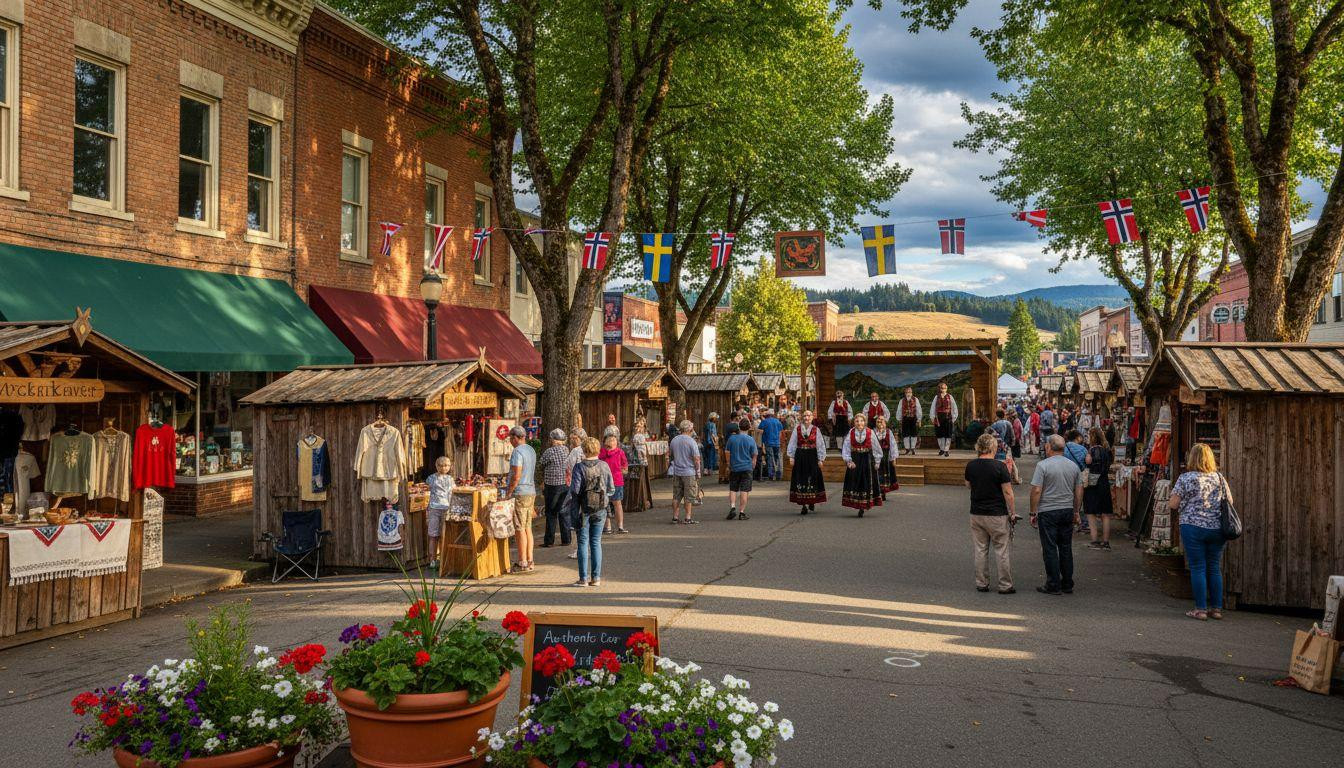Every August in Junction City, Oregon, the air fills with the sound of Nordic folk songs as 100,000 visitors descend on this town of 6,000 residents. Accordion melodies drift from three festival stages while the scent of lefse and krumkake wafts through downtown streets. This isn’t a Renaissance faire or tourist attraction. It’s one of America’s most authentic folklore festivals, where third-generation Scandinavian families share traditions passed down since 1961.
Eight small American towns preserve similarly genuine festivals that most travelers never discover. These aren’t commercialized events designed for Instagram. They’re living traditions where locals participate as seriously as their grandparents did decades ago.
America’s hidden festival circuit
While millions crowd Oktoberfest celebrations, authentic American folk festivals survive in towns under 50,000 residents. These communities host events rooted in immigrant heritage, local history, and quirky traditions that predate modern tourism.
Junction City’s Scandinavian Festival exemplifies this authenticity. The volunteer-operated event received Oregon Heritage Tradition designation in 2014. Each day honors a different Nordic country with rotating themes. Sunset Magazine rated it among America’s best for “emphasis on authenticity” in 2008.
Angels Camp, California (population 3,800) has hosted frog jumping competitions since Mark Twain’s era. The annual Calaveras County Fair draws 20,000 visitors who watch trained frogs leap for prizes. This gold rush town inspired Twain’s famous story “The Celebrated Jumping Frog of Calaveras County.”
Strange traditions with deep roots
Hobo culture preserved in Iowa
Britt, Iowa calls itself the “Hobo Capital of the World.” Since 1900, the town has hosted the National Hobo Convention where thousands gather to crown a King and Queen of the Hobos. Population 2,000 swells to 10,000 during the August event.
The festival preserves Depression-era culture through authentic hobo stew cooking contests and vintage rail car displays. Victorian mining towns across Nevada share similar authentic preservation efforts, maintaining historical character without modern commercialization.
Route 66 music heritage
Winslow, Arizona (population 9,800) hosts the Standin’ on the Corner Festival celebrating The Eagles’ song “Take It Easy.” The town’s golden stone buildings and Route 66 heritage create an atmospheric backdrop for desert music performances. Festival attendance reaches 50,000 annually.
The event connects to authentic railroad history. Winslow served as a major depot on the Atchison, Topeka and Santa Fe Railway. Today’s festival preserves both musical and transportation heritage.
Festival season experiences
Timing your visit perfectly
Junction City’s festival runs Thursday-Sunday during the second week of August (August 14-17, 2025). Entry costs nothing, unlike European folk festivals charging $50-100 daily admission. Hotel rates jump from $85-120 to $120-180 during festival weekend.
Angels Camp’s Jumping Frog Jubilee occurs in May when spring weather perfect for outdoor competitions. Accommodation ranges from $90-180 nightly. Mount Shasta’s volcanic mysticism lies 140 miles northeast, creating perfect two-destination itineraries.
Authentic local flavors
Junction City serves genuine Nordic specialties during festival days. Fårikål (Norwegian lamb stew), salmiakki (salty licorice), and æbleskiver (Danish pancake puffs) represent recipes unchanged since immigrant families arrived in the 1800s.
Food vendors must prove family heritage or authentic recipes to participate. This requirement eliminates generic festival fare found at commercialized events. Meal prices range $12-25, considerably less than urban food festivals.
Cultural authenticity verification
Unlike Renaissance faires or staged attractions, these festivals maintain community ownership. Junction City residents participate as 70% of volunteers and performers. The Scandinavian Cultural Foundation operates the event as a nonprofit supporting local youth programs.
Britt’s Hobo Convention receives support from families whose relatives actually rode the rails during the Depression. Historical accuracy matters to organizers who reject Hollywood stereotypes in favor of authentic hobo culture preservation.
Recent visitor surveys from 2025 show 85% of festival attendees describe experiences as “genuinely cultural rather than touristy.” Traditional mountain communities throughout America face similar challenges balancing tourism with cultural preservation.
Planning your festival road trip
These eight towns cluster across regions suitable for multi-festival itineraries. Junction City pairs with Eugene’s Saturday Market 45 minutes away. Angels Camp connects to Sacramento within 2 hours. Drive times between festivals range 2-6 hours through scenic countryside.
Summer festivals concentrate in June-August when weather cooperates. Shoulder seasons offer lower accommodation costs and smaller crowds while maintaining festival authenticity. Coastal towns provide similar authentic experiences during quieter months.
Book accommodations months ahead for popular festivals like Junction City’s Scandinavian celebration. Camping options exist near most venues at $25-40 nightly rates.
Your questions about small town folklore festivals answered
Which festivals welcome families with children?
Junction City’s Scandinavian Festival offers family-friendly activities throughout four days. Children participate in traditional folk dancing lessons and craft workshops. Angels Camp provides supervised frog handling experiences during jumping competitions. All eight festivals maintain alcohol-free zones and child-appropriate entertainment.
How do locals view tourist attendance?
Community surveys show 90% of residents support festival tourism when visitors respect local customs. Locals appreciate guests who learn basic cultural phrases or participate in traditional activities. Problems arise when visitors treat festivals as photo opportunities rather than cultural experiences.
Are these festivals becoming commercialized tourist traps?
Authenticity varies by location. Junction City maintains strict vendor requirements and nonprofit management. Angels Camp balances tourism with historical accuracy. Towns under 10,000 population typically preserve better authenticity than larger festival destinations. Corporate sponsorship remains minimal compared to urban events.
August morning light filters through Junction City’s maple trees as accordion music begins another festival day. Visitors arrive early to watch Nordic dancers practice their steps. Local children wave small flags while grandparents share stories in native languages. This is America’s living folklore, preserved in small towns that remember their roots.
